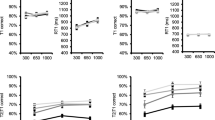Abstract
Three dual-task experiments examined the influence of processing a briefly presented visual object for deferred verbal report on performance in an unrelated auditory-manual reaction time (RT) task. RT was increased at short stimulus-onset asynchronies (SOAs) relative to long SOAs, showing that memory consolidation processes can produce a functional processing bottleneck in dual-task performance. In addition, the experiments manipulated the spatial compatibility of the orientation of the visual object and the side of the speeded manual response. This cross-task compatibility produced relative RT benefits only when the instruction for the visual task emphasized overlap at the level of response codes across the task sets (Experiment 1). However, once the effective task set was in place, it continued to produce cross-task compatibility effects even in single-task situations (“ignore” trials in Experiment 2) and when instructions for the visual task did not explicitly require spatial coding of object orientation (Experiment 3). Taken together, the data suggest a considerable degree of task-set inertia in dual-task performance, which is also reinforced by finding costs of switching task sequences (e.g., AC → BC vs. BC → BC) in Experiment 3.




Similar content being viewed by others
References
Allport, A., & Wylie, G. (1999). Task-switching: Positive and negative priming of task-set. In G. W. Humphreys, J. Duncan & A. M. Treisman (Eds.), Attention, space and action: Studies in cognitive neuroscience (pp. 273–296). Oxford: Oxford University Press.
Arnell, K. M., & Duncan, J. (2002). Separate and shared sources of dual-task cost in stimulus identification and response selection. Cognitive Psychology, 44, 105–147.
Azuma, R., Prinz, W., & Koch, I. (2004). Dual-task slowing and effects of cross-task compatibility. Quarterly Journal of Experimental Psychology, 57A, 693–713.
Carrier, L. M., & Pashler, H. (1995). Attentional limits in memory retrieval. Journal of Experimental Psychology: Learning, Memory, & Cognition, 21, 1339–1348.
De Jong, R. (1995). The role of preparation in overlapping-task performance. Quarterly Journal of Experimental Psychology, 48A, 2–25.
Hommel, B. (1998). Automatic stimulus-response translation in dual-task performance. Journal of Experimental Psychology: Human Perception & Performance, 24, 1368–1384.
Hommel, B., & Doeller, C. F. (2005). Selection and consolidation of objects and actions. Psychological Research, 69, 157–166.
Jolicoeur, P., & Dell’Acqua, R. (1998). The demonstration of short-term consolidation. Cognitive Psychology, 36, 138–202.
Jolicoeur, P., & Dell’Acqua, R. (1999). Attentional and structural constraints on visual encoding. Psychological Research, 62, 154–164.
Jolicoeur, P., Tombu, M., Oriet, C., & Stevanovski, B. (2002). From perception to action: Making the connection. In W. Prinz & B. Hommel (Eds.), Attention and Performance XIX: Common mechanisms in perception and action (pp. 558–586). Oxford: Oxford University Press.
Koch, I., & Prinz, W. (2005). Response preparation and code overlap in dual tasks. Memory & Cognition (in press).
Koch, I., & Prinz, W. (2002). Process interference and code overlap in dual-task performance. Journal of Experimental Psychology: Human Perception & Performance, 28, 192–201.
Koch, I., Metin, B., & Schuch, S. (2003). The role of temporal uncertainty for process interference and code overlap in perception-action dual tasks. Psychological Research, 67, 244–252.
Lien, M.-C., & Proctor, R. W. (2002). Stimulus-response compatibility and psychological refractory period effects: Implications for response selection. Psychonomic Bulletin & Review, 9, 212–238.
Logan, G. D., & Schulkind, M. D. (2000). Parallel memory retrieval in dual-task situations: I. Semantic memory. Journal of Experimental Psychology: Human Perception & Performance, 26, 1072–1090.
Luria, R., & Meiran, N. (2003). Online order control in the psychological refractory period paradigm. Journal of Experimental Psychology: Human Perception & Performance, 29, 556–574.
Monsell, S. (2003). Task switching. Trends in cognitive science, 7, 134–140.
Müsseler, J., & Hommel, B. (1997). Blindness to response-compatible stimuli. Journal of Experimental Psychology: Human Perception & Performance, 23, 861–872.
Navon, D., & Miller, J. (1987). Role of outcome conflict in dual-task interference. Journal of Experimental Psychology: Human Perception & Performance, 13, 435–448.
Pashler, H. (1994). Dual-task interference in simple tasks: Data and theory. Psychological Bulletin, 116, 220–244.
Pashler, H. (2000). Task switching and multitask performance. In S. Monsell & J. Driver (Eds.), Attention and Performance XVIII: Control of cognitive processes (pp. 277–307). Cambridge, MA: MIT Press.
Rogers, R. D., & Monsell, S. (1995). Costs of a predictable switch between simple cognitive tasks. Journal of Experimental Psychology: General, 124, 207–231.
Rumiati, R. I., & Humphreys, G. W. (1998). Recognition by action: Dissociating visual and semantic routes to action in normal observers. Journal of Experimental Psychology: Human Perception & Performance, 24, 631–647.
Schuch, S., & Koch, I. (2004). The costs of changing the representation of action: Response repetition and response-response compatibility in dual tasks. Journal of Experimental Psychology: Human Perception & Performance, 30, 566–582.
Stevanovski, B., Oriet, C., & Jolicoeur, P. (2003). Can blindness to response-compatible stimuli be observed in the absence of a response? Journal of Experimental Psychology: Human Perception & Performance, 29, 431–440.
Stoet, G., & Hommel, B. (2002). Interaction between feature binding in perception and action. In W. Prinz & B. Hommel (Eds.), Attention and Performance XIX: Common mechanisms in perception and action (pp. 538–552). Oxford: Oxford University Press.
Tucker, M., & Ellis, R. (1998). On the relations between seen objects and components of potential actions. Journal of Experimental Psychology: Human Perception & Performance, 24, 830–846.
Tucker, M., & Ellis, R. (2001). The potentiation of grasp types during visual object categorization. Visual Cognition, 8, 769–800.
Acknowledgements
We would like to thank Pierre Jolicoeur, Dorit Wenke, and an anonymous reviewer for helpful comments on a previous version of this article. Correspondence concerning this article should be addressed to Iring Koch, Max Planck Institute for Human Cognitive and Brain Sciences, Department of Psychology, Amalienstrasse 33, D-80799 Munich, Germany. E-mail: iring.koch@cbs.mpg.de.
Author information
Authors and Affiliations
Corresponding author
Rights and permissions
About this article
Cite this article
Koch, I., Rumiati, R.I. Task-set inertia and memory-consolidation bottleneck in dual tasks. Psychological Research 70, 448–458 (2006). https://doi.org/10.1007/s00426-005-0020-8
Received:
Accepted:
Published:
Issue Date:
DOI: https://doi.org/10.1007/s00426-005-0020-8




